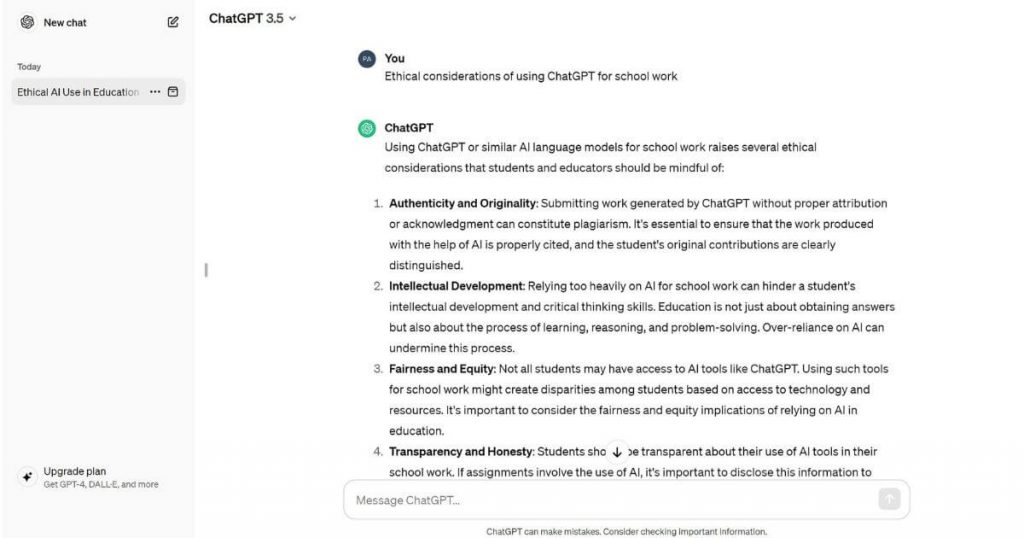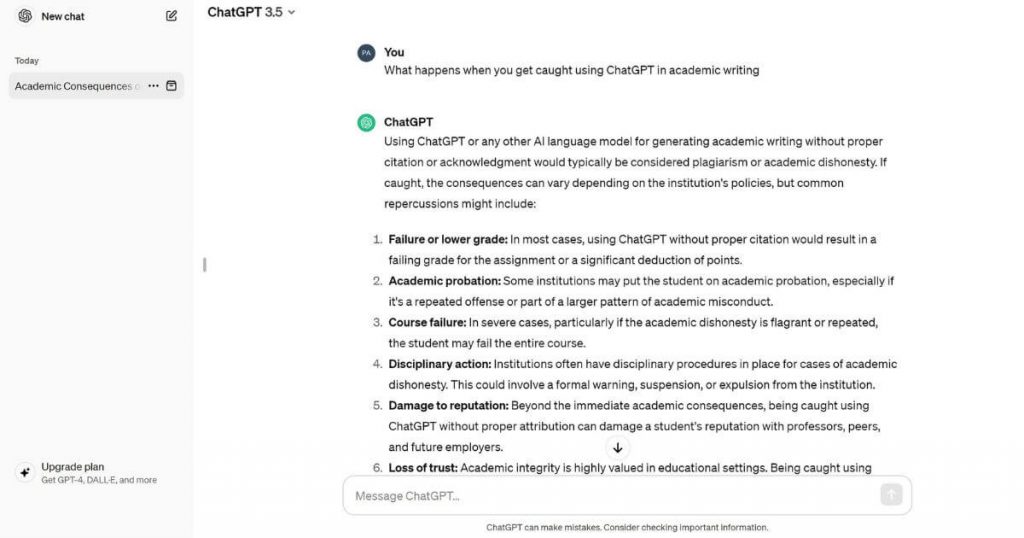As artificial intelligence (AI) tools grow more advanced by the day, they beckon with promises to ease our scholarly burdens. Indeed, there’s much at stake when deadlines loom large and shortcuts glitter invitingly in the distance.
This article discusses responsible digital usage, providing tips to enhance your writing skills and reshape your perspective on writing tasks.
How to Use ChatGPT and Not Get Caught [Key Takeaways]
- ChatGPT can help with homework, but using it too often might make you less sharp. Always add your own ideas to what AI suggests.
- Don’t fail to cite your sources. Lack of proper attribution can be considered plagiarism, which is a serious offense. Improper AI usage can lead to severe sanctions.
- Proofread and fact-check your work. Use different checkers to avoid red flags from AI detection software that thinks you used AI when you didn’t.
- Instructors can identify AI-written text by themselves or by using advanced AI detection tools.
- Be careful with personal information around AI tools. Know the tool’s settings to keep your details safe.
What Are the Risks of Using ChatGPT for Assignments?
ChatGPT is a versatile natural language model developed by OpenAI that has been at the center of many discussions regarding its use in education.
Yes, ChatGPT is a tool that can make your life easier. However, utilizing it to complete academic assignments without disclosure or permission is not the right thing to do.
Academic integrity violations
Academic integrity codes are in place at virtually every academic institution, and violating them can lead to serious consequences such as receiving a zero, failing the class, or worse. To avoid such risks, prioritize doing original work and learning from each assignment. This not only ensures your academic integrity but also contributes to your intellectual growth.
Potential for dependency
ChatGPT may be a great aid, but relying on it too much can diminish your own writing and thinking skills. I recommend using ChatGPT wisely as an educational tool rather than a shortcut. Let your own thoughts steer the ship of your content creation process.
“Directly employing these tools for essay writing creates concerning dependency issues and ethical dilemmas. While advanced AI can produce human-like text, it lacks the original analysis and conceptual mastery that students should develop themselves. Relying on it stunts growth.” — John Pennypacker, VP, Sales and Marketing, Deep Cognition
Inaccuracy concerns
ChatGPT, like any other AI tool, is not infallible. Avoid using AI-generated text without further refinement. Mistakes, particularly those about safety-related aspects, might creep in while using ChatGPT to generate content. Double-checking critical information from trusted sources or experts is a prudent practice.
“Challenges surfaced when ChatGPT occasionally produced content that, while creative, didn’t align with academic rigor. It highlighted the importance of using this tool as a complement to human judgment rather than a standalone resource.” — Ben Richardson, Director, Acuity Training
Ethical considerations

Using ChatGPT for school work raises ethical questions about fairness, originality, and privacy. Maintaining academic honesty, respecting others’ ideas, and being mindful of privacy concerns are imperative. To avoid getting caught using ChatGPT, you must do so sparingly to uphold the values of independent learning.
“The use of ChatGPT in academic writing raises ethical questions about plagiarism and the authenticity of the work. It’s essential to acknowledge when ChatGPT has been used in your research or writing and give proper credit. Transparency is key here. Hiding or misrepresenting the use of AI tools in academic work is considered unethical.” — Adam Hardingham, CEO and SEO Consultant, Rivmedia
How to Not Get Caught Using Chat GPT
In the academic realm, it’s essential to navigate the use of AI tools carefully to maintain integrity. Below, I’ll share methods to help you leverage ChatGPT wisely without raising red flags in your writing assignments.
- Use AI as a supplementary tool: If you are wondering how to not get caught using Chat GPT for essays, my best tip is to consider AI as a helpful assistant rather than the primary creator. Various AI tools can generate ideas and outlines for you to kickstart your assignments.
- Personalize AI-written content: To avoid detection when using ChatGPT, add your personal touch to AI content. Incorporate your own stories, experiences, and research to make the writing distinctly yours, confounding AI detectors.
- Conduct thorough proofreading: Ask a peer to proofread your text or leverage online tools for checking spelling and grammar.
- Improve readability: Keep your words simple. If necessary, paraphrase the text manually or use paraphrasing tools. As for the latter, be careful, because plagiarism detectors, such as Turnitin, may flag paraphrased content as AI.
- Implement safe practices for AI engagement: Familiarize yourself with the settings of AI tools to protect your privacy. Educators should guide students on responsible AI use. Be cautious about sharing data and understand the permissions you are granting to the AI in question.
Bonus tip: For school work, it’s better to rely on ChatGPT Plus, which is based on GPT-4. It provides better accuracy and faster performance and can handle more complex tasks. For comparison, the free version works with GPT-3.5, which is less advanced. However, whichever model you choose, there’s no guarantee that it will pass AI detection. I’ve written an article on possible ways of bypassing ChatGPT detectors—it’s a good read, so take a look.
Caught Using ChatGPT: What Happens Next?

Using texts generated by ChatGPT without giving it due credit can lead to some serious consequences. Here’s what you might face:
Reputation takes a hit
Your reputation is not just a fleeting concern. It’s a valuable asset that can influence your academic and professional journey. A tarnished reputation might affect how others perceive your abilities and credibility, potentially impacting future recommendations and opportunities.
Strained relationships
Education is a collaborative process. When you use AI without proper acknowledgement, it can strain your relationship with educators. Trust is a crucial element in any learning environment, and if your teachers feel you’re not being transparent about your sources or ChatGPT use, it could affect the support and guidance they offer.
Academic penalties
The repercussions of using AI without disclosure can extend beyond a mere academic setback. There’s a genuine risk of facing penalties, including receiving a zero on an assignment, failing the course, or even encountering more severe disciplinary actions. This isn’t just about a single assignment. It’s about the potential long-term impact on your academic record.
Recognizing Detection Methods
Understanding how ChatGPT usage might ring alarm bells is a crucial step. Let’s explore what signs might give you away.
Plagiarism software sensitivity
Plagiarism detection tools struggle to detect ChatGPT content because ChatGPT doesn’t plagiarize. Turnitin has stepped up its game, though. They’ve made a special detector just for spotting if students hand in papers written by AI. It checks the writing style and other clues to guess if a machine wrote a piece of text instead of a human.
Professors’ familiarity with students’ writing styles
Can professors detect Chat GPT? Well, most likely, yes. Teachers often know their students’ writing styles well. Drastic style changes may raise suspicion. Balancing the use of AI with personal input is crucial to maintaining your unique voice.
Advanced detection techniques
Schools and tech companies are developing advanced techniques to detect AI-written content. Programs like GPTZero and other AI detection tools analyze text complexity and style to discern human vs. AI writing.
Ethical Use of ChatGPT in Academia
Exploring the ethical use of ChatGPT in academic settings opens up a dialogue on how you can responsibly integrate AI without compromising core academic values. Here’s what I want to advise you on:
Embrace AI for idea generation
AI tools like ChatGPT can be valuable resources for generating ideas. Use AI to enhance your creative process, but ensure you integrate its suggestions thoughtfully, adding your unique perspective.
“ChatGPT can be useful for idea generation. For example, by entering your topic or essay prompt into ChatGPT, the AI system generates an answer. Do not rely on this answer; rather, use it as a starting point or launchpad from which to begin your writing. I believe ChatGPT can be used ethically in academic writing by using it as I describe above.” — John DeJoy, Associate Professor, Clarkson University
Respect academic honesty policies
Adhering to academic honesty policies is essential. Cheating, including using AI without proper acknowledgment, undermines the learning process. Schools enforce these rules to ensure fair play. Remember always to cite your sources, even when it comes to chatbots like ChatGPT.
Understand the role of AI in student learning
Recognize the positive impact of AI on learning. ChatGPT and similar tools offer diverse ways to access information and understand complex concepts. Responsible use of AI in education can enhance learning opportunities.
Simon Bacher, CEO and Co-founder of Ling App shares one possible application of ChatGPT for educational purposes that’s quite interesting and innovative, in my opinion:
“ChatGPT helps users enhance writing and communication skills in a target language through text-based conversations. It provides suggestions, corrections, and feedback for essays or written assignments and offers insights into cultural nuances related to expressions or phrases. ChatGPT provides instant feedback, allowing you to see your language learning progress in real time. It is like having a tutor correct your vocabulary, grammar, and syntax.” — Simon Bacher, Co-Founder, Ling
Navigating False Positives and Accusations
Even with the utmost integrity, encountering false positives from plagiarism and AI detection software can happen. If such accusations arise, it’s essential to understand how to address these challenges effectively.
If your work is flagged by plagiarism detection tools like SafeAssign, scrutinize the report, discuss the issue with your teacher, and provide drafts to demonstrate your writing process. Understand the limitations of online detection tools and use multiple checkers for thorough scrutiny.
Stay calm if accused of using AI. Explain your writing process, share drafts, and address the specific reasons for suspicion. Offer to rewrite sections or answer questions to prove your understanding.
Can ChatGPT and Academic Writing Coexist?
Many students wonder if they can use ChatGPT to generate written content for their essays. Some might ask, “How not to get caught using Chat GPT?” or “Can teachers detect Chat GPT use in student works?”
It’s important to note that while AI technology can be impressive, educators are becoming increasingly savvy at recognizing the use of AI-generated content. They might notice if a student’s writing style suddenly changes or seems unusually sophisticated for their level.
Furthermore, schools may begin to use AI detection software, which could help them instantly spot work produced by models like ChatGPT.
Conclusion: Balancing Innovation With Integrity
Leveraging ChatGPT for academic projects necessitates a thoughtful and safe approach. Blend your ideas with AI assistance, personalize the content, and maintain honesty in your writing. Believe in your capabilities and let your unique ideas shine, whether with or without AI’s help.
Thinking about “How to use Chat GPT and not get caught” or “How to not get caught with Chat GPT” is approaching the issue from the wrong angle. Using ChatGPT for academic work requires a smart and safe approach.
For a comprehensive analysis of how AI can enhance academic writing, explore my WordAI review.
FAQ
What are some features of ChatGPT that make it a useful tool?
ChatGPT, developed by OpenAI, is a tool that uses artificial intelligence to generate human-like, written content based on a data set and user input. This makes ChatGPT a valuable resource for various applications, including language modeling and conversation-based interactions.
Can students use ChatGPT?
Yes, they can. ChatGPT can assist in students’ academic work, provided they understand the ethical considerations and academic integrity implications. If students use AI technology to assist them with their tasks, then they must do so according to their educational institution’s guidelines.
What are the risks of using ChatGPT for academic writing?
While ChatGPT is a useful tool for generating written content, there are inherent risks of misuse, such as using it to cheat on school projects or assignments or inadvertently generating content that may be flagged as plagiarized by online detection tools.
Can you get caught using Chat GPT?
When students ask, “Can teachers tell if you use Chat GPT?” or “How do teachers know if you use ChatGPT?”, they should remember that educators are trained to notice discrepancies in their students’ work. Plus, many teachers form a good understanding of their students’ abilities and writing voices over time, thus being able to spot AI-generated text vs. student-written content.
Can AI detection tools detect AI-generated content like ChatGPT?
Yes, in most cases, AI detection tools are capable of detecting AI-written content, including that produced by ChatGPT.
Can schools detect Chat GPT?
Yes, many schools employ plagiarism checkers and AI detection systems to check the originality of work. If ChatGPT usage is detected, it might be considered cheating.
Is using ChatGPT against the rules at school?
Various school districts and educational institutions view using ChatGPT without disclosure as a violation of their rules, as they emphasize independent thinking and learning.
How do I ensure my work stays original, even with AI’s help?
If AI helps you with brainstorming or research, the next step is to express your thoughts and concepts in your own words to maintain originality. Using plagiarism detection tools to check your work is a good idea.
How do I not get caught using Chat GPT for writing assignments?
Don’t use AI to write your essays for you. If a teacher suspects AI use, it may lead to trouble, as it could be perceived as academic dishonesty. Providing clear explanations of your writing process becomes crucial in such situations.
Can I trust all the information from AI without checking the facts?
You cannot always trust AI-generated information, as there is a high chance of it producing inaccurate or unreliable information. Verify all facts from reliable sources.



